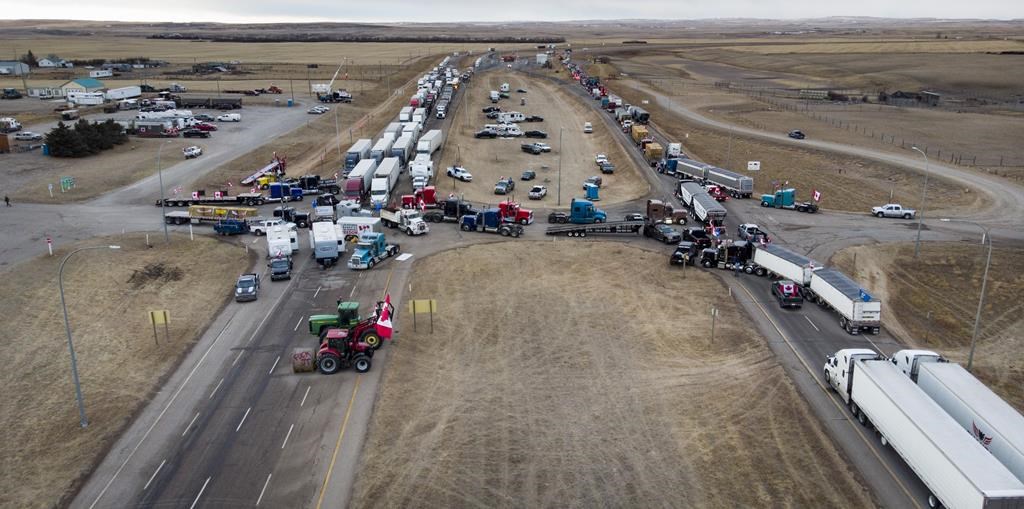One of two men charged with conspiring to murder RCMP officers at the Coutts, Alta., border blockade two years ago testified Tuesday he wasn’t aware that the custom-made rifle he had purchased was a prohibited weapon.

Chris Carbert said he paid $5,000 for the DPS Panther A15 rifle found under his mattress in an early morning police raid of a trailer in the village the night he was arrested.
Carbert and Anthony Olienick are being tried together before a jury in Court of King’s Bench in Lethbridge.
The two were charged after police made arrests and seized weapons at the blockade in early 2022.
Carbert said he purchased the assault rifle two weeks before the blockade began but hadn’t even sighted the scope for it.
“It says DPS Panther A15. Did you know what kind of gun it was? What I mean by that is…what type of firearm it was?” Crown prosecutor Steven Johnston asked Carbert.
“What made it special to you?”
“That it was custom built and just it looked awesome,” Carbert replied.
“Do you know what an AR-15 is?” said Johnston. “I’m going to suggest to you that the reason you paid $5,000 plus another $1,500 for a scope for it is because you knew it was an AR-15. That’s a special gun in Canada.”

Get daily National news
“OK, but I didn’t know,” Carbert protested.

Carbert has testified he brought guns and body armour to the blockade, but said there was no plan for violence unless he had to perhaps flee to the mountains and fend off someone trying to give him a COVID-19 vaccine shot.
He also told the jury that he had little to do with Olienick and others staying in the trailer, that he was “grumpy and sick” as he tried to recover from COVID-19.
Johnston, in a tense exchange with the accused, suggested when Carbert was arrested in the raid, he did more than just call a lawyer before surrendering. He said Carbert made an attempt to hide his weapons and had to make a decision.
“You were trying to decide, ‘How do I come out? Do I come with my hands on my head’ or on the trigger of your gun? That’s what you were trying to decide?” said Johnston.
“Definitely not.”
“You were thinking, ‘Is this the war? Is this them coming for me and is this my war?'” Johnston continued.
“Definitely not.”
“Even all that talk that you’ve given us if they came for you out in the mountains?” Johnston asked.
“But we’re nowhere near that point, Mr. Johnston,” Carbert said. “They’re not coming to stick a needle in my arm.”
The protest against COVID-19 rules and vaccine mandates tied up traffic for two weeks at the Alberta-U.S. border crossing at Coutts.
It ended quickly and peacefully when police seized weapons and made arrests.
Johnston also asked Carbert about a conversation Carbert had with a friend in late 2021 in which he said, “If they think they are coming for my kids they better be prepared because they will likely be leaving in a body bag.”
“Did you say that to him?” Johnston queried.
“Yeah, I said that. I mean I’ve said some colourful things. There’s no doubt about it,” he replied. “I’ve also said if they came to put the vaccine in me and my kid that they weren’t doing it.”
Court has heard Olienick considered the blockade the fight of a lifetime against a government bent on ending individual freedoms.







Comments
Comments closed.
Due to the sensitive and/or legal subject matter of some of the content on globalnews.ca, we reserve the ability to disable comments from time to time.
Please see our Commenting Policy for more.